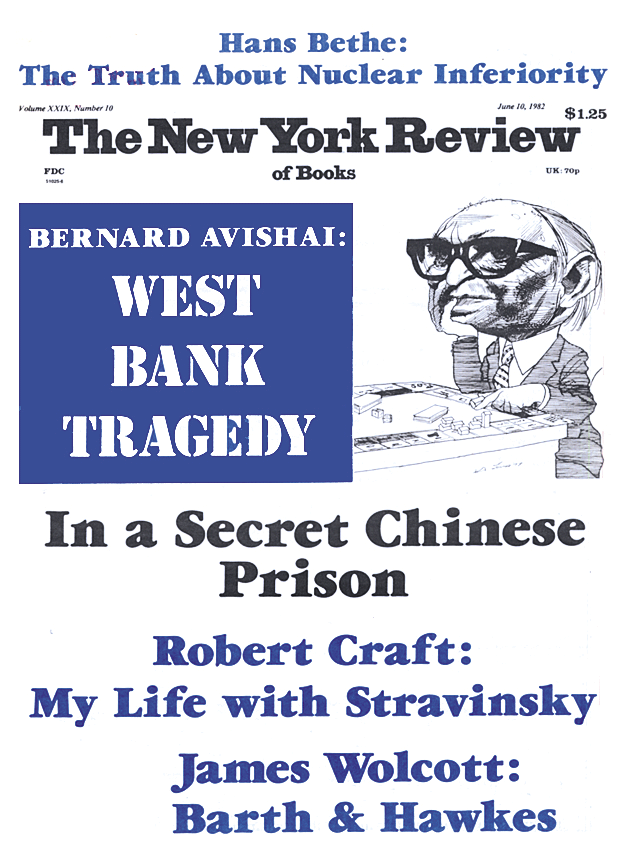In response to:
A Bunch of Reds from the March 4, 1982 issue
To the Editors:
Elizabeth Hardwick’s footnote about Louis Fraina, in her article “A Bunch of Reds” [NYR, March 4] cleared up a long-forgotten mystery for me about the man I knew nearly forty years ago as Lewis Corey.
Ms. Hardwick wrote that Fraina, a founder of the American Communist Party and intimate of John Reed, had led “a life of one miserable opaque drama after another.” But at the time I knew him as a social science professor at Antioch College, in the early 1940s, his life seemed calm and idyllic. When I went to Antioch as a 16-year-old freshman in 1943 Mr. Corey was living with his wife and daughter, Olga, in a charming little house called “Dove Cottage,” nestled under a tree at the edge of a meadow that bordered the campus.
A few hours after I arrived at Antioch College Olga came to my room to ask me to join a campus political organization that she said worked for causes supported by the labor movement. Olga appeared to be in her early twenties, stocky and round-faced, with reddish-blonde hair and huge dark eyes. Since I was flattered that she had asked me, I quickly agreed to join. The next night an upperclass-woman came and signed me up for another political action group that sounded similar to Olga’s. It was only later that I found out the two groups were at logger-heads. Olga’s was reputedly anti-Communist but socialist, the other was “anti-red-baiting” and socialist. In any event, other activities intervened and I don’t remember attending meetings of either group.
But shortly after Olga’s visit to my room another student invited me to a party at the Coreys’ cottage. The evening turned out to be charged with an atmosphere I have experienced many times since, but at the time was totally new and exotic. As I remember it, the tiny book-lined living room was lit by candles and filled with people sitting on the floor—at Mr. Corey’s feet. Mrs. Corey sat beside him, looking like an older version of Olga but with thick, jet black hair parted in the middle and pulled back into a bun. She looked very Russian, and indeed taught both Russian and German at Antioch.
The people at the party, including the students, all seemed to know about events, and other people, I had never heard of. When a man in a black turtleneck sweater played the guitar and sang songs about workers and union organizing, all the others knew the words and joined in. I envied them for sharing what seemed to be a rich culture I could never hope to acquire.
It’s hard to believe now how incurious I must have been at the time. Despite the immense attraction of the Coreys I never asked anyone about their past history and no one ever offered to tell me. But I did take every course he taught, including labor economics, a seminar on social change, and a course called “World Reconstruction.” I have forgotten most of what he said, but Mr. Corey’s physical presence is still vivid to me. He bore no resemblance to the actor who portrayed Louis Fraina in Reds. Mr. Corey was small, with a pointed nose and chin under a shock of grey hair. He looked rather like an aging boy. One of his eyes was badly out of focus, so that as he paced up and down, his head turned sideways to the class, he seemed to be glaring at both sides of the room at once. From time to time his bad eye enabled him to glare and smile simultaneously.
He spoke in a harsh staccato, punctuating his words by thrusting his thumbs forward. Eventually, no matter what course he was teaching, he got around to stressing three ideas: 1. When World War II was over the United States would have to take the lead in building a better world; 2. If labor and management would abandon their traditional enmity and work together as a team for greater productivity, they could greatly increase both wages and profits; 3. After the war the nations of the world should take part in a rational division of labor, whereby some provided raw materials, and other industrial goods, to a free world market. Our final exam in “World Reconstruction” consisted of a single question, to be answered in four hours: “What political and economic institutions do you recommend for re-building the postwar world?” He almost convinced us that our recommendations would count.
Mr. Corey’s lectures were upbeat, but never complacent. The United States and the world could become places where everyone enjoyed freedom, enough to eat, and productive jobs. But only if all of us were willing to bring this about. I sat through his classes inspired, and believing. Consequently I was totally unprepared for an incident that occurred during one of his lectures in my second or third year at Antioch. At the beginning of class some three or four students who were identified on campus as being pro-Communist filed in and sat in the back of the room. About half way through the lecture they stood up and shouted, “What did you do with the money, Louie?” It was all over in a moment, Mr. Corey silently watched them leave, his small face drawn into a mask. Then he resumed the lecture where he had left off.
Many years later I heard about Mr. Corey’s career as an American Bolshevik and of the lunatic effort by the US government to deport him. But it wasn’t until I learned from Elizabeth Hardwick that he had been accused of “embezzling” $4,200 in Communist Party funds that I understood that strange outburst in his classroom. I would like to think that Louis Fraina had found peace during his years at Antioch, but I suppose most of us will never know.
Rachelle Marshall
Stanford, California
This Issue
June 10, 1982


